Related Research Articles

Sir Edmund Andros was an English colonial administrator in British America. He was the governor of the Dominion of New England during most of its three-year existence. At other times, Andros served as governor of the provinces of New York, East and West Jersey, Virginia, and Maryland.

Meldrim Thomson Jr. was an American politician who served three terms as the 73rd governor of New Hampshire from 1973 to 1979. A Republican, he was known as a strong supporter of conservative political values.

The Province of New Hampshire was an English colony and later a British province in New England. It corresponds to the territory between the Merrimack and Piscataqua rivers on the eastern coast of North America. It was named after the English county of Hampshire in southern England by Captain John Mason in 1629, its first named proprietor. In 1776, the province established an independent state and government, the State of New Hampshire, and joined with twelve other colonies to form the United States.

John Guy was an English merchant adventurer, colonist and politician who sat in the House of Commons from 1621 to 1624. He was the first proprietary governor of Newfoundland Colony, the first attempt to establish a colony on Newfoundland.

John Carnell Crosbie was a Canadian provincial and federal politician who served as the 12th lieutenant governor of Newfoundland and Labrador, Canada. Prior to being lieutenant governor, he served as a provincial cabinet minister under Premiers Joey Smallwood and Frank Moores as well as a federal cabinet minister during the Progressive Conservative (PC) governments of Joe Clark and Brian Mulroney. Crosbie held several federal cabinet posts, including minister of finance, minister of justice, minister of transport, minister of international trade, and minister of fisheries and oceans.
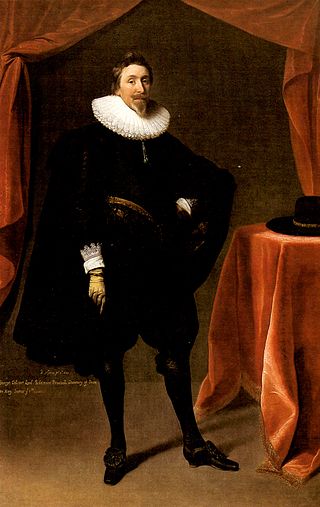
George Calvert, 1st Baron Baltimore was an English peer and politician. He achieved domestic political success as a member of parliament and later Secretary of State under King James I. He lost much of his political power after his support for a failed marriage alliance between Prince Charles and the Spanish House of Habsburg royal family. Rather than continue in politics, he resigned all of his political offices in 1625 except for his position on the Privy Council and declared his Catholicism publicly. He was created Baron Baltimore in the Peerage of Ireland upon his resignation. Baltimore Manor was located in County Longford, Ireland.
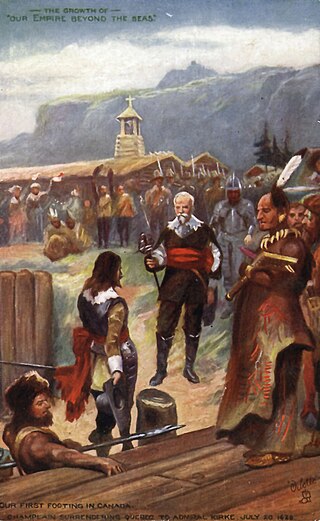
Sir David Kirke, also spelled David Ker, was an adventurer, privateer and colonial governor. He is best known for his successful capture of Québec in 1629 during the Anglo-French War and his subsequent governorship of lands in Newfoundland. A favourite of Charles I, Kirke's downfall came with that of the Crown during the English Civil War and it is believed he died in prison.
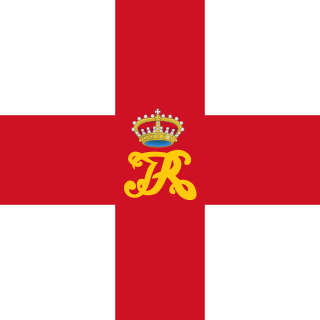
The Dominion of New England in America (1686–1689) was an administrative union of English colonies covering all of New England and the Mid-Atlantic Colonies, with the exception of the Delaware Colony and the Province of Pennsylvania. The region's political structure was one of centralized control similar to the model used by the Spanish monarchy under the Viceroyalty of New Spain. The dominion was unacceptable to most colonists because they deeply resented being stripped of their rights and having their colonial charters revoked. Governor Edmund Andros tried to make legal and structural changes, but most of these were undone and the Dominion was overthrown as soon as word was received that King James II had vacated the throne in England. One notable change was the forced introduction of the Church of England into Massachusetts, whose Puritan leaders had previously refused to allow it any foothold.
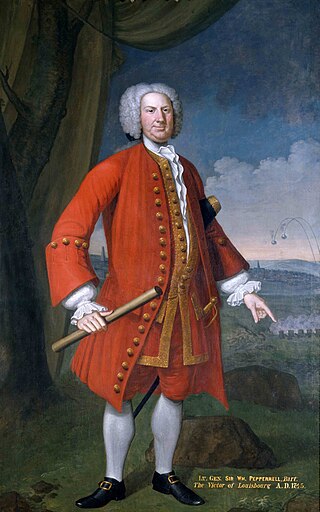
Sir William Pepperrell, 1st Baronet was an American merchant and soldier in colonial Massachusetts. He is widely remembered for organizing, financing, and leading the 1745 expedition that captured the French fortress of Louisbourg during King George's War. He owned a number of enslaved people and was considered one of the richest people in America.
D'Arcy Wentworth was an Irish-Australian surgeon and the first paying passenger to arrive in the new colony of New South Wales. He served under the first seven governors of the Colony, and from 1810 to 1821, he was "great assistant" to Governor Lachlan Macquarie. Wentworth led a campaign for the rights and recognition of emancipists and for trial by jury.
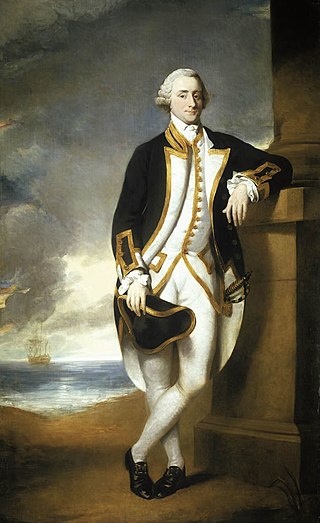
Admiral Sir Hugh Palliser, 1st Baronet was a Royal Navy officer. As captain of the 58-gun HMS Eagle he engaged and defeated the French 50-gun Duc d'Aquitain off Ushant in May 1757 during the Seven Years' War. He went on to serve as Commodore Governor of Newfoundland, then Controller of the Navy and then First Naval Lord. During the American Revolutionary War he came into a famous dispute with Augustus Keppel over his conduct as third-in-command of the Channel Fleet at the inconclusive Battle of Ushant in July 1778; the dispute led to Palliser being court-martialled, although he was subsequently acquitted. In retirement Palliser became Governor of Greenwich Hospital.

Lieutenant General Sir John Gaspard Le Marchant (1803–1874) was a British Army officer and governor of Newfoundland from 1847 to 1852. He later became the Lieutenant Governor of Nova Scotia (1852–1858) and Governor of Malta (1858–1864).

Philippe Pastour de Costebelle was a French naval officer and Governor of Newfoundland and then Louisbourg. He was born in Languedoc, France and died in Louisbourg, New France.
Sir Thomas Temple, 1st Baronet was an English proprietor and governor of Acadia/Nova Scotia (1657–70). In 1662, he was created a Baronet of Nova Scotia by Charles II.
Jacques-François de Monbeton de Brouillan French military officer and Governor of Plaisance (Placentia), Newfoundland (1689-1701) and Acadia (1701-1705).

By the arrangements of the Canadian federation, the Canadian monarchy operates in Newfoundland and Labrador as the core of the province's Westminster-style parliamentary democracy. As such, the Crown within Newfoundland and Labrador's jurisdiction is referred to as the Crown in Right of Newfoundland and Labrador, His Majesty in Right of Newfoundland and Labrador, or the King in Right of Newfoundland and Labrador. The Constitution Act, 1867, however, leaves many royal duties in the province specifically assigned to the sovereign's viceroy, the lieutenant governor of Newfoundland and Labrador, whose direct participation in governance is limited by the conventional stipulations of constitutional monarchy.
Lafontaine Bellot was Governor of Plaisance (Placentia), Newfoundland from 1664 to 1667.
Nicolas Gargot de La Rochette was Governor of Plaisance (Placentia), Newfoundland in 1660. The post was left vacant until 1662.

The province of Newfoundland and Labrador covers the period from habitation by Archaic peoples thousands of years ago to the present day.
Anthony Parkhurst was an English explorer and promoter of English colonisation of North America in the 1570s and 1580s. He is best known for his early engagement in the English fishery off Newfoundland and his exploration of the island and its resources.
References
- ↑ Wentworth, John (1878). The Wentworth Genealogy, English and American. Vol. I. Boston: Little, Brown, and Company.